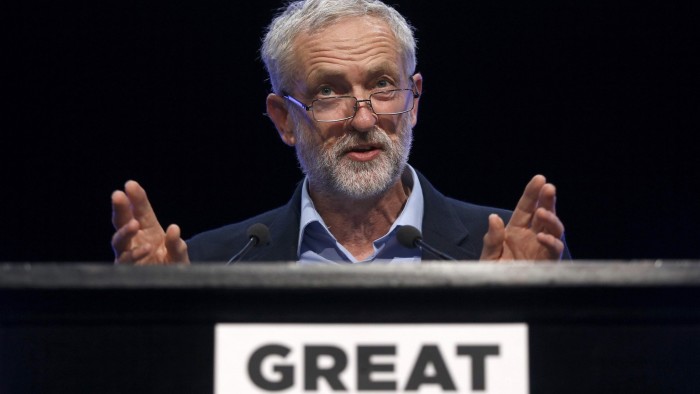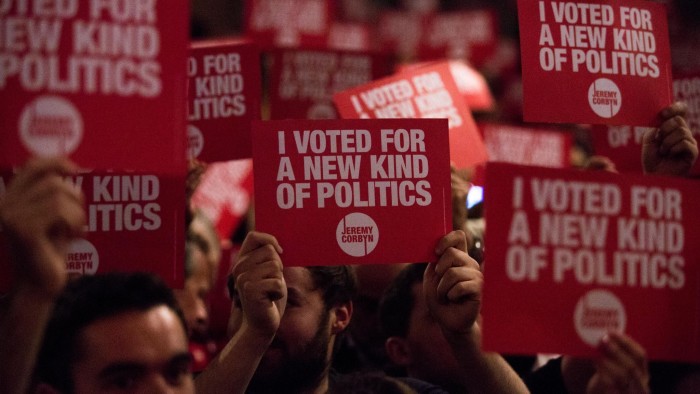Jeremy Corbyn vows to oppose ‘Brexit’ and backs EU tax on City

Jeremy Corbyn on Thursday vowed unequivocally that Labour will fight to keep Britain in the EU, arguing that he sees membership as a means of imposing tougher regulations and a new tax on the City of London.
Mr Corbyn’s promise that Britain’s opposition Labour party will campaign against “Brexit” will come as a relief to many business leaders who feared he might put himself at the head of a populist movement for Britain to quit the EU.
The veteran leftwing MP was elected Labour leader last week on a wave of support from party veterans and young idealists lured by his anti-austerity message and fiery socialist rhetoric.
But he now faces the challenge of winning round the 90 per cent of Labour MPs who did not back him in the leadership contest. Many of them worry he could reverse Labour’s pro-European policy: in a referendum in 1975 Mr Corbyn voted for Britain to leave the EU.
Europe needs a new economic settlement

Some see EU as an exclusive club not a democratic forum for social progress, writes Jeremy Corbyn
Read more
Though Thursday’s pledge will reassure many in the party, there will be concern at his vow that if he wins power he will sign Britain up to the £50bn EU financial transaction tax — fiercely opposed by the City of London — and back tougher workers’ protections.
After days of confusion, Mr Corbyn wrote an opinion piece in the Financial Times to set out his EU policy in detail for the first time, declaring: “We will be in Europe to negotiate better protections for people and businesses, not to negotiate them away.”
He added: “Our shadow cabinet is clear that the answer to any damaging changes that [prime minister David] Cameron brings back from his renegotiation is not to leave the EU but to pledge to reverse those changes with a Labour government elected in 2020.”
Mr Corbyn hopes the FT article will settle once and for all the uncertainty that he has sown about his approach to Mr Cameron’s in-out referendum, which could take place as soon as next year.
The Labour leader had told a meeting of his MPs this week that he would not give Mr Cameron a “blank cheque”, hinting he could support a Brexit if the prime minister watered down EU workers’ rights.
But on Thursday Mr Corbyn’s office sent a briefing note to Labour MPs declaring: “Labour will be campaigning in the referendum for the UK to stay in the European Union.”
The pledge will be seen as a victory for senior Labour figures, including Hilary Benn, shadow foreign secretary, who had urged him to come off the fence.
In another sign of Mr Corbyn’s softening position, the Labour leader has asked Pat McFadden, a pro-European Blairite, to continue as the party’s shadow Europe minister.
In his FT article, Mr Corbyn called for fundamental EU reforms, including a rejection of austerity, stronger worker protection and a halt to “free market deregulation”. He also warned that an EU-US trade deal could represent “a race to the bottom”.
The Labour leader’s support for a financial transactions tax — or Tobin tax — will concern the City. It is the most ambitious attempt ever made to create a pan-European levy on the financial sector, which originally aimed to raise more than £50bn through hitting almost all EU bond, share and derivative transactions.
Britain led opposition to the 2011 proposal and blocked an EU-wide tax, prompting 11 eurozone states including Germany, France and Italy to move ahead as a vanguard.
Yet after several years of meandering discussions, they remain at odds over the scope of the joint levy and its implementation.
Podcast
Jeremy Corbyn: how long can he last as a Labour leader?

Chief political correspondent Jim Pickard asks FT columnists Philip Stephens and Janan Ganesh how long Corbyn can last at the helm.
The participation of Britain could break that deadlock. One of the main fears in Berlin and Paris is that a stringent tax, narrowly imposed on the participating eurozone countries, would encourage financial operators to decamp to London and other financial centres.
Wolfgang Schäuble, Germany’s finance minister, said earlier this week that he would push for the tax to apply eventually in all EU countries.
Another point of contention is how to distribute revenues between member states. Should Britain join, it would face demands to share the spoils of taxes collected from London-executed transactions in eurozone stocks or bonds.
In depth

David Cameron is under pressure from all sides and faces a delicate balancing act in attempting to renegotiate an acceptable UK membership settlement with the EU
Further reading
The tax — sometimes referred to as a “Robin Hood” tax — has long drawn the ire of the City. Banking associations say it would have a dangerous effect, clogging up markets and hurting the economy. Banks claim most costs will be passed on to investors and consumers.
The European Commission’s original impact assessment highlighted that the tax would wipe out or displace up to 90 per cent of derivatives transactions and hit the bloc’s economic output by almost 1.8 per cent over the long term.
George Osborne, the chancellor, launched a legal challenge against the financial transactions tax over fears an extraterritorial FTT would effectively ensnare trades executed in the City of London. While the suit was rejected, Britain is expected to file a further case should the 11 FTT countries implement a tax.
After talks between the 11 at the weekend, Pierre Moscovici, the EU’s economics commissioner, said “important if not decisive progress” was made. “This deal is possible, and more than possible, if we go on working with ambition,” he added.
Comments